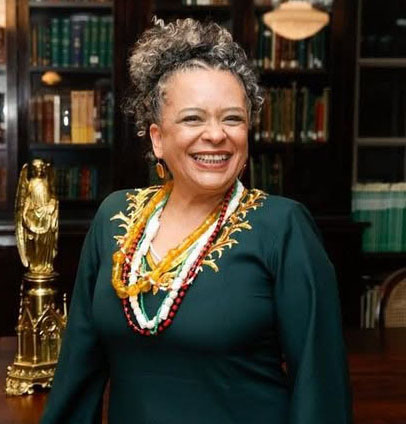Ana Maria Gonçalves was inducted into the Brazilian Academy of Letters in a ceremony in Rio de Janeiro on Friday, November 7, 2025.
Academia Brasileira de Letras (English: Brazilian Academy of Letters) is a non-profit literary society founded in Rio de Janeiro in 1897. Inspired by the Académie Française, it was established by 40 writers and poets to cultivate and promote the Portuguese language and Brazilian literature. The Academy has 40 permanent members, who must be Brazilian citizens, and 20 foreign correspondent members. It also houses one of the largest public libraries in Rio, a multimedia center, and maintains the Orthographic Vocabulary of the Portuguese Language.
The vacancy for seat 33 opened following the death of its previous occupant, grammarian and philologist Evanildo Bechara, in May. With 30 votes in her favor, 54-year-old Ana Maria Gonçalves from Minas Gerais was elected as the new member. This makes her the first Black woman to join the Academy since its founding in 1897.
Before becoming a full-time writer, Gonçalves worked as a professor and in advertising. She has written the novels Ao lado e à margem do que sentes por mim (2002) and Um defeito de cor (2006), the latter telling the story of Kehinde, an African woman searching for her son throughout the 19th century. Her short stories have been included in anthologies published in Portugal and Italy, and in 2009, the newspaper O Globo named one of her books among the best Brazilian works of the previous decade.

The induction ceremony was attended by a large number of Black guests, many dressed in white, a custom for Friday, which is the day of Oxalá. Bahian singer and composer Gilberto Gil, a member of the Academy since 2022, presented Gonçalves with her diploma.
In her speech, Ana Maria Gonçalves said, “Here I am today, 128 years after its founding, as the first Black woman writer elected to the Brazilian Academy of Letters, speaking Black Portuguese and writing from notions of oral literature and lived experience. I take on as one of my missions to promote diversity in this institution and to advance the things I have always criticized, such as the lack of diversity in its membership, greater openness to the public, and a stronger commitment to the dissemination and promotion of Brazilian literature.”


Leave a Reply